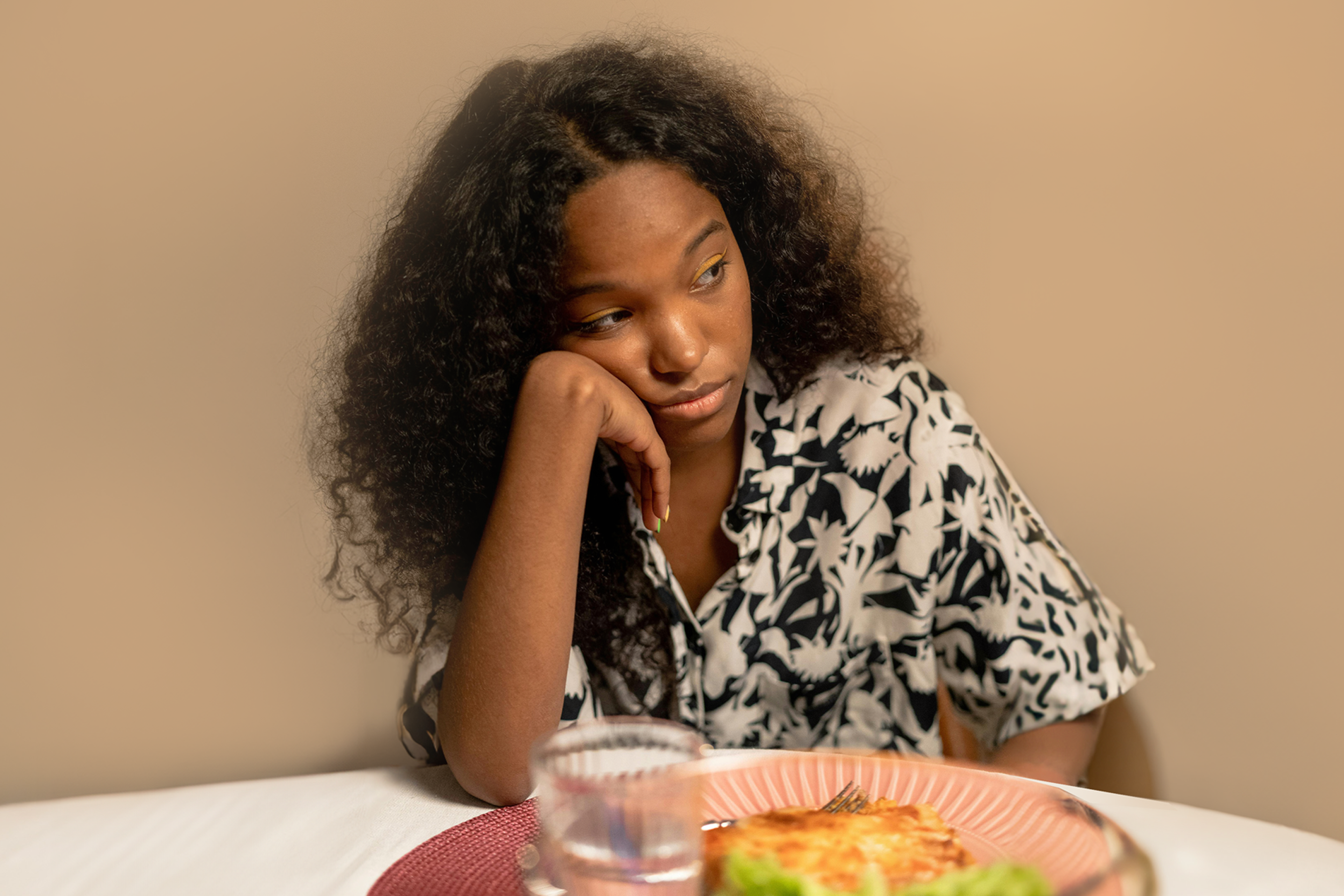


There's a common misconception that people can never truly recover from an eating disorder, or that they are destined to relapse. It’s true, the risk of eating disorder relapse can be significant: the numbers vary depending on which study you look at, but research suggests that up to 50% of people in eating disorder recovery relapse within the first few years of treatment. While the statistics can be disheartening, it’s important to know that true healing is possible. To help your loved one get there, it’s essential to understanding the risks and warning signs associated with eating disorder relapse—and be prepared to intervene.
What is an eating disorder relapse?
The words “recovery” and “relapse” might seem straightforward, and yet the eating disorder field doesn’t have exact definitions of these terms. However, there is a consensus that a relapse is characterized by a return of symptoms after a period of recovery.
When do eating disorder relapses occur?
Eating disorder relapse can happen any time, but we know from research that the first year after completing treatment is the most vulnerable period for patients, with the relapse risk generally decreasing over time. In addition, certain stressors, including work or school stress, big life events, and special events like holidays, can be common triggers for relapse. Some of the most vulnerable times for relapse include:
- Starting or returning to college
- Beginning a new job or graduate program
- Getting married
- Pregnancy
- Surgery, particularly oral surgery, such as wisdom teeth removal
- Weight loss for reasons not related to an eating disorder (illness, grief, medication, increased activity, etc.)
- Death of a loved one
- Loss of a friendship or romantic relationship
- Traumatic events
What are the warning signs of an eating disorder relapse?
If you’re concerned a loved one may be experiencing a relapse, that worry can sometimes be a sign in itself—even if you can’t put your finger on a specific behavior or red flag. Family and friends who’ve supported someone through eating disorder recovery talk about developing a “spidey sense” that the eating disorder may be active again.
The same warning signs for the onset of an eating disorder can re-emerge during a relapse, as well as relapse-specific warning signs. These may include:
- Deviating from the post-treatment plan (specific to relapse)
- Looking back at the eating disorder with fondness (specific to relapse)
- Secrecy around food or exercise (While secrecy is also a sign of the onset of an eating disorder, the secrecy that develops with a relapse may be more pronounced, as the person struggling knows that most of the people around them are aware of their eating disorder history and treatment plan.)
- Weight loss
- Lack of expected growth in children and adolescents
- Skipping meals
- Avoiding eating with family or friends
- Following new “rules” about eating
- Wearing baggy or oversized clothing
- Evidence of purging behaviors (e.g., using the bathroom after meals, excessive exercise)
- Changes in mood, such as symptoms of depression or anxiety, or signs of euphoria
What can you do if you think your loved one is relapsing?
If you notice warning signs of an eating disorder relapse, it can be difficult to know what to say and how to say it. It’s important to share your concerns with compassion and a nonjudgmental tone. Your loved one may not even realize they are struggling again, despite the evidence of relapse being clear to you. Their eating disorder may lead them to vehemently deny there is a problem, or they may realize what’s happening but refuse treatment and not want to acknowledge it due to a sense of shame.
Expressing your unconditional love and willingness to support them can go a long way toward encouraging a continued recovery journey. Practical steps, like offering meal support and scheduling appointments with medical and/or mental health care providers, will help you both feel steadier as your loved one resumes focus on healing.
Some patients and families prefer, when possible, to continue care with members of their prior treatment team; others find it necessary or helpful to start working with someone new. No matter what the next stage of treatment looks like, having your loving support can make all the difference.
Do you have to start over after a relapse?
It can feel overwhelming to consider starting treatment again. It makes sense to feel grief and fear at the thought of returning to the hard work of recovery. The good news is you aren’t usually starting over at square one: this time, you have a lot more skills, knowledge, and resources than you did before.
So while it may feel like “starting over,” both patients and their families are often more equipped to handle the challenge of eating disorder recovery. And for those who didn’t have sufficient support during prior treatment, a relapse can be a time to gather additional professional and social support for recovery.
What's the difference between a lapse and a relapse?
Sometimes it’s difficult to tell if someone is experiencing a temporary struggle or is on the path to an eating disorder relapse. A lapse, a brief or isolated return of eating disorder behaviors, does not always signal the beginning of a relapse but could indicate the need for more skill-building and support.
It can be helpful to remember that recovery isn't linear; it's common throughout the weeks, months, or even years of recovery to occasionally have periodic returns of eating disorder thoughts or behaviors. It’s unrealistic to expect that recovery means always feeling happy or never having an eating disorder thought. We should expect that these challenging moments will happen, and understand that experiencing these emotions, thoughts, and urges is normal.
What matters most is how someone responds to these challenges when they come up. Do they respond by acting on their thoughts or feelings? Or do they use skills they learned in treatment or reach out for more support? The former signals an inability to bounce back from these moments, and could turn a lapse into a relapse.
Encourage your loved one to be kind to themselves. Remind them that no one is perfect, and recovery certainly isn't perfect—nor does it need to be. Even those without eating disorders have bad days. A lapse doesn't have to lead to a full-blown relapse. Instead, a lapse can be an opportunity for your loved one to use skills, reach out for support, and learn what they need to be more resilient going forward.
How do you lower the risk for relapse?
The first step in lowering the risk for relapse is reaching a solid recovery rather than what many call “partial recovery.” Partial recovery often means the patient has a significant reduction in symptoms or an improvement in nutrition that resolves medical complications (such as orthostatic vitals, bradycardia, or amenorrhea) but they still feel burdened with eating disorder thoughts and behaviors that interfere with their life. Some families describe partial recovery as “surviving,” while full recovery is “thriving.”
Patients in partial recovery may have a lot of rules around eating, anxiety around certain foods, fear of weight gain, and/or body image concerns. Often these patients have restored some weight but may not be at a recovery-supporting weight that is right for their body; research indicates that a higher weight at discharge may predict a lower risk of relapse. Other patients may have reached a recovery weight range but still feel beholden to the eating disorder’s rules around food, exercise, or body size; having these lingering psychological symptoms also increases the risk of relapse.
Recovery is hard work that takes time and a lot of patience; it’s tempting for patients and their families to want to pause or be done once the worst is behind them. Without sufficient support to continue challenging the eating disorder, however, patients in partial or “half-way recovery” are at increased risk for a full relapse.
What is an eating disorder relapse prevention plan?
Even patients in a state of robust recovery still benefit from having a relapse prevention plan, or a written document co-created by a patient, their treatment team, and any family or friends supporting recovery. This plan is developed in preparation for discharge from treatment and addresses the following key areas:
- Anticipating potential triggers
- Having coping skills and strategies in place to manage stressors
- Knowing where to go for support
- Identifying signs of relapse
- Defining when a return to treatment would be necessary
Is there such a thing as relapse-proof recovery?
In a world that is strongly influenced by diet culture and constantly sends messages that sound like eating disorder thoughts (“eat less, move more” is just one of the more normalized examples), it can be challenging to stay in recovery. With the support of a treatment team and loved ones, however, patients can develop a relapse prevention plan that sets them up for a strong and resilient recovery.
If you're worried that a loved one is experiencing an eating disorder relapse, it's important to get them prompt support. Early intervention can prevent a lapse from turning into a relapse, or help them get back on track quickly if a full relapse occurs. Talk with your medical provider or schedule a consultation with our team.







